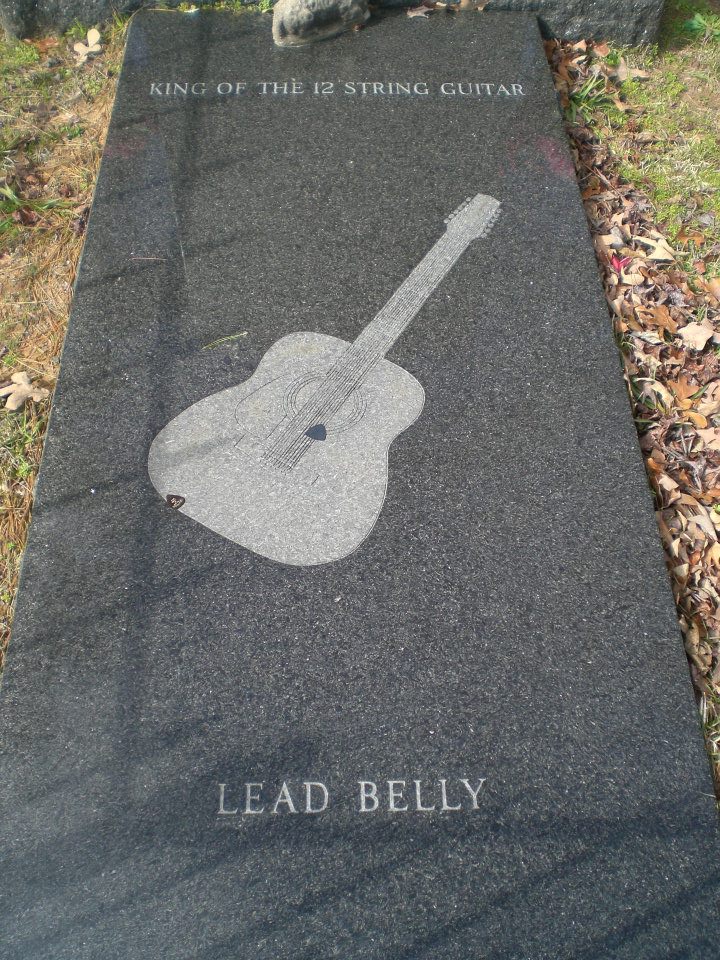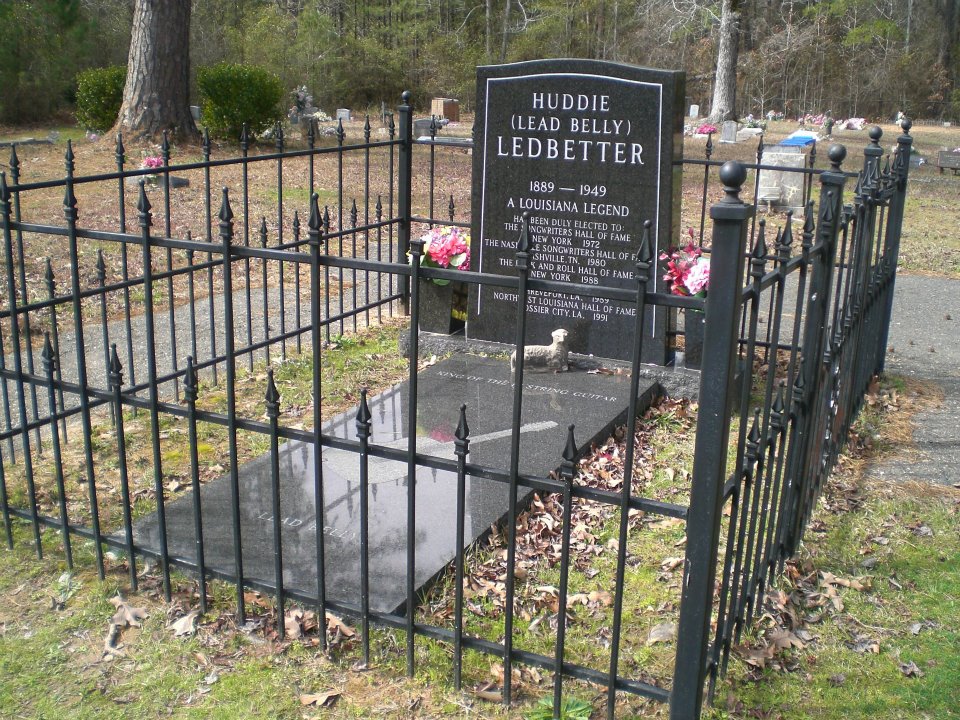.jpg) Leadbelly's Grave
Leadbelly's Grave
By Jeff Campbell
I'm dreaming tonight of an old Southern town
The best friend I ever had
Been wonderin' and worryin' and rovin' 'round
Now I'm goin' back home to my Dad
Your hair has turned to silver
I know you're fading too
Daddy, dear old Daddy
I'm comin' back to you
Made my boyhood happy
Still I longed to roam
I've a-had my way, but now I'll stay
I long for you and for home.
Just south of Caddo Lake, Farm to Market Road 1999 becomes Caddo Parish Road 6 as you head east into Louisiana. About two miles across the state line Shiloh Baptist Church and its adjacent cemetery sit off to the left. There are many Shiloh Baptist Churches with cemeteries across the south but this one holds the final resting place of one of American music's most influential artists.
Huddie William Ledbetter was born on January 20th, 1888 in Mooringsport, Louisiana. Better known to the world of music as "Lead Belly", he would become legendary due to his mastery of the twelve string guitar and that he collected and recorded many American folk songs. These songs would be recorded by numerous artists through the years and become part of America's musical heritage.
There are many versions of how Huddie William Ledbetter became known as Lead Belly. The most reasonable version is that it's a play on his last name Ledbetter. Others say it came from surviving a shotgun blast to the stomach and others say his nickname came from his ability to consume large quantities of moonshine. Whichever version is true; Lead Belly embraced the moniker and adopted it as his stage name.
Lead Belly would lead two distinct lives in his adult years. One life was spend in the rural south working as a field hand, spending time in and out of jail and traveling across the south as a blues singer. HIs other life was spent in the urban north as a folk singer, recording artist and performer. However Lead Belly, like other great artists, would not achieve great fame until his life was over.
Leaving Mooringsport at the age of 16, Lead Belly rambled across the south working as a field hand. It was during this time that he began to absorb all the musical forms that he came across. These songs included everything from folk ballads, cowboy songs and spirituals to blues, field call & response songs and prison hollers.
These songs were recorded by Lead Belly and many of them became standards; recorded over the years in many different versions by a diverse group of artists. Many of these songs are immediately recognizable and include "Black Betty", "Blue Tail Fly ( Jimmy Crack Corn and I Don't Care)", "C.C. Rider", 'Cotton Fields", "Down in the Valley to Pray", "Easy Rider", "Goodnight Irene", "In New Orleans (House of the Rising Sun)", "Midnight Special" and "Rock Island Line".
Lead Belly's other contribution to the music world was his mastery of the twelve string guitar. The twelve string guitar groups the strings into six courses. The tone produced on these six courses is richer and has more of a ringing sound. This was a huge influence on Roger McGuinn and the Byrds who had hits in the 1960's like "Turn, Turn, Turn" and "Hey Mr. Tambourine Man". Roger McGuinn achieved that signature ringing, jingle-jangle sound on a Rickenbacker 360 12 string. Other artists who were influenced by Lead Belly's 12 string prowess included George Harrison & John Lennon of the Beatles, Gordon Lightfoot and Bob Dylan.
It's safe to say that Lead Belly is one of the patron saints of American music but in his personal life he was anything but a saint. Lead Belly possessed a violent temper that led to many arrests and time on the chain gang. Twice he was convicted of major crimes, murder in 1917 and attempted murder in 1930. In both instances he was pardoned by the Governors of Texas (1925) and Louisiana (1933); practically singing his way to freedom. In fact in 1930 he wrote and sent a song to Texas Governor Pat Neff, seeking his freedom and tugging at the Governor's strong religious convictions.
After his second pardon, which was aided by folklorist Alan Lomax, Lead Belly headed north to New York for a new start. At first he worked as Lomax's chauffeur and an occasional performer. Soon he found an appreciative audience in the growing folk community and became friends with folk legends such as Pete Seeger and Woody Guthrie. For the last 15 years of his life Lead Belly would perform many concerts and record songs on a variety of record labels. Lead Belly mesmerized audiences with his strong voice and mastery of the 12 string guitar. In 1949, at the age of 61, Lead Belly would lose his life to Lou Gehrig's disease. His body was brought back to Mooringsport, Louisiana and buried at Shiloh Baptist Church.
If you pay a visit to the final resting place of the "King of the 12 String Guitar" take Interstate 20 west from Shreveport, Louisiana or East from Marshall, Texas; at the Greenwood, Louisiana exit, head north on Highway 169 to Blanchard. Then turn left and go west 8 miles on Caddo Parish Road 6 (also known as the Blanchard-Latex Road) to Shiloh Baptist Church. As you step out of your car you may hear the sounds of an acoustic guitar drifting through the Louisiana pines. That's not Lead Belly, just another traveling musician seeking a little divine inspiration at the foot of Lead Belly's grave.


